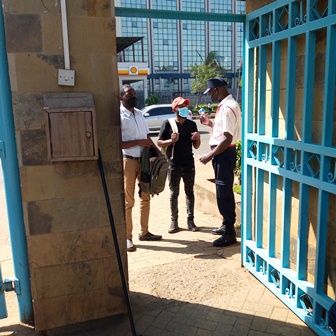
1. COVID 19 AWARENESS
WORKING SAFELY DURING CORONAVIRUS (COVID-19)
Risk assessment
- It is very important to carry out risk assessment in line with the Ministry of Health Covid -2019 Protocols and Guidelines.
- Consulting with your workers and other stakeholders
Taking body temperatures and wearing face masks
- Taking temperatures of all workers at the entrances
- Those whose body temperatures exceeds 37.5 degrees Celsius should be advised to seek medical assistance
- Wearing of face mask appropriately all the time
Develop cleaning, handwashing and hygiene procedures
- Encourage people to follow the MoH guidance on hand washing and hygiene procedures
- Provide hand sanitizers around the work place
- Frequently cleaning and disinfecting objects and surfaces that are touched regularly
- Enhance cleaning of busy areas
- Setting a clear use and cleaning guidance of toilets
- Provide hand drying facilities
Help People to work from home
- Discuss home working arrangements
- Ensuring they have the right equipment, for example remote access to work systems
- Including the in all necessary communication
- Looking after their physical health
Maintain social distancing
- Where possible you should maintain 2m between people by
- Putting up signs to remind workers and visitors of social distancing guidance
- Avoid sharing workstations
- Use floor tape or paint to mark areas to help people keep a 2m distance
- Switch to seeing visitors by appointment only if possible
Where people cannot be 2m apart, manage transmission risk
- Keep the activity time involved as short as possible
- Use screens or barriers to separate people from each other
- Stagger arrival and departure times
- Reducing the number of people each person has contact with using ‘fixed teams or partnering.
2. Respect for fundamental rights key to peaceful elections in Kenya: UN experts
UN-Habitat/Julius Mwelu
The Kenyan capital Nairobi. Voters will go to the polls to elect a new president on 9 August, 2022.
21 July 2022
Independent UN human rights experts on Thursday called on authorities and political candidates standing in next month’s general election to foster an enabling civic space to ensure the vote goes ahead peacefully, and prevent violence.
“Civic space, public participation, fundamental freedoms and a violence-free environment are critical to foster inclusive engagement in the electoral process, and the exercise of political rights,” the experts emphasised in a press release from the UN human rights office OHCHR, as the East African nation prepares to go to the polls on 9 August.
Political tensions during the campaign as well as hate speech by candidates and their supporters, have a dangerous potential to ignite flames of violence, said the experts.
They urged all parties to uphold the right to political participation, freedoms of assembly, opinion and expression, and to respect the role of an independent judiciary.
Code of conduct
“All those involved in the electoral process must commit themselves to peaceful conduct prior, during and after elections. Candidates and political parties must refrain from using inflammatory language which may lead to violence and human rights abuses, particularly against women, persons with disabilities, LGBTIQ+ individuals or ethnic groups,” they said.
Kenya has a history of contested elections and political violence, marked by human rights violations, including loss of life, as well as sexual and gender-based violence, the experts noted.
In the aftermath of the 2007 ballot, more than 1,000 people were killed and 350,000 displaced in ethnic riots. Both then rival presidential candidates Uhuru Kenyatta and William Ruto were summoned to the International Criminal Court (ICC) to face charges of crimes against humanity. Charges were eventually dropped against Mr. Kenyatta, and Mr. Ruto’s case was dismissed.
Lack of accountability
“Perpetrators who committed human rights violations during past elections are yet to be held accountable,” the experts noted.
Concerned by the impact of repeated violence during past elections denying the right to political participation - particularly for women candidates and voters – the independent experts urged Kenyan authorities to ensure everyone can participate freely in the electoral process, without discrimination.
At the same time, activists, human rights defenders, election monitors and journalists should be allowed to work without intimidation or reprisals. “They play a crucial role during elections to contribute to a free and inclusive electoral process and the credibility of results,” the experts recalled, welcoming the commitment by authorities to refrain from communications shutdowns during the election period.
Familiar faces
The leading candidates are former Prime Minister Raila Odinga who has been endorsed by former rival and current president, Mr. Kenyatta, and Mr. Ruto, who is the current deputy president.
Kenya's election law requires that a presidential candidate win more than 50 percent of the vote for an outright win. This presidential election will be Kenya's third under the constitution established in 2010.
The independent rights experts who issued the statement receive their mandates from the UN Human Rights Council, which is based in Geneva.
They operate in their individual capacity and are neither UN staff, nor are they paid for their work.
